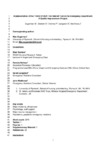Implementation of the ‘TAKE STOCK’ Hot Debrief Tool in the ED: a quality improvement project
| dc.contributor.author | Sugarman, M | |
| dc.contributor.author | Graham, B | |
| dc.contributor.author | Langston, S | |
| dc.contributor.author | Nelmes, Pamela | |
| dc.contributor.author | Matthews, J | |
| dc.date.accessioned | 2021-08-11T17:57:54Z | |
| dc.date.issued | 2021-08 | |
| dc.identifier.issn | 1472-0205 | |
| dc.identifier.issn | 1472-0213 | |
| dc.identifier.uri | http://hdl.handle.net/10026.1/17561 | |
| dc.description.abstract |
<jats:p>Hot debriefing (HoD) describes a structured team-based discussion which may be initiated following a significant event. Benefits may include improved teamwork, staff well-being and identification of learning opportunities. Existing literature indicates that while staff value HoD following significant events, it is infrequently undertaken in practice. Internationally, several frameworks for HoD have been developed, although none are widely adopted for use in the ED. A quality improvement project was conducted to introduce HoD into a single UK ED in North West England, between January and March 2019. Following stakeholder consultation, the 9-item ‘TAKE STOCK’ tool was developed. Implementation of the tool increased the number of HoD (0—2.2 HoD episodes/week). Findings from the first plan-do-study-act (PDSA) cycle are presented, which revealed the key strengths and limitations of this model. Staff perceptions of the tool were evaluated using a self-administered short questionnaire designed by the authors. Satisfaction with TAKE STOCK was assessed using 10-point numerical scales. Across respondents (n−15), average satisfaction scores exceeded 9 out of 10 concerning patient care, staff self-care, decision-making, education, teamwork and identification of equipment issues. Implementation of HoD into the ED is feasible and viewed as beneficial by staff. Implementation toolkits for TAKE STOCK have been requested by 42 additional UK hospitals and ambulance trusts, demonstrating significant interest in its use. Research is now required to formally validate HoD frameworks for use in the ED, and assess whether HoD results in sustained improvements to staff and patient outcomes.</jats:p> | |
| dc.format.extent | 579-584 | |
| dc.format.medium | Print-Electronic | |
| dc.language | en | |
| dc.language.iso | en | |
| dc.publisher | BMJ | |
| dc.subject | clinical care | |
| dc.subject | major incidents | |
| dc.subject | major trauma management | |
| dc.subject | paediatric emergency medicine | |
| dc.subject | paediatrics | |
| dc.subject | psychology | |
| dc.subject | staff support | |
| dc.subject | Emergency Service, Hospital | |
| dc.subject | England | |
| dc.subject | Feedback | |
| dc.subject | Humans | |
| dc.subject | Patient Care Team | |
| dc.subject | Quality Improvement | |
| dc.title | Implementation of the ‘TAKE STOCK’ Hot Debrief Tool in the ED: a quality improvement project | |
| dc.type | journal-article | |
| dc.type | Journal Article | |
| plymouth.author-url | https://www.webofscience.com/api/gateway?GWVersion=2&SrcApp=PARTNER_APP&SrcAuth=LinksAMR&KeyUT=WOS:000678987500004&DestLinkType=FullRecord&DestApp=ALL_WOS&UsrCustomerID=11bb513d99f797142bcfeffcc58ea008 | |
| plymouth.issue | 8 | |
| plymouth.volume | 38 | |
| plymouth.publication-status | Published | |
| plymouth.journal | Emergency Medicine Journal | |
| dc.identifier.doi | 10.1136/emermed-2019-208830 | |
| plymouth.organisational-group | /Plymouth | |
| plymouth.organisational-group | /Plymouth/Faculty of Health | |
| plymouth.organisational-group | /Plymouth/Faculty of Health/School of Nursing and Midwifery | |
| plymouth.organisational-group | /Plymouth/Research Groups | |
| plymouth.organisational-group | /Plymouth/Research Groups/Institute of Health and Community | |
| plymouth.organisational-group | /Plymouth/Users by role | |
| plymouth.organisational-group | /Plymouth/Users by role/Academics | |
| dc.publisher.place | England | |
| dcterms.dateAccepted | 2020-11-26 | |
| dc.rights.embargodate | 2021-10-6 | |
| dc.identifier.eissn | 1472-0213 | |
| dc.rights.embargoperiod | Not known | |
| rioxxterms.versionofrecord | 10.1136/emermed-2019-208830 | |
| rioxxterms.licenseref.uri | http://www.rioxx.net/licenses/all-rights-reserved | |
| rioxxterms.licenseref.startdate | 2021-08 | |
| rioxxterms.type | Journal Article/Review |


